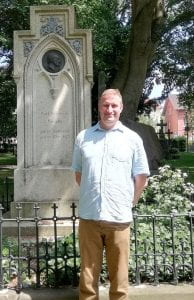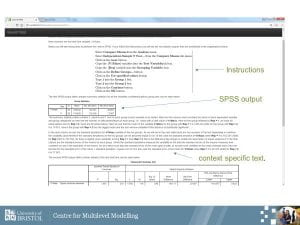Our latest series of blogs introduces you to our University of Bristol’s Turing Fellows, where the Jean Golding Institute have been speaking to some of the thirty Alan Turing Institute Fellows to find out a little more about their work and research interests.
Last time we spoke to Philip Hamann, NIHR Clinical Lecturer in Rheumatology and Turing Fellow who spoke to us about his work developing artificial intelligence (AI) methods to monitor and manage individuals with rheumatoid arthritis remotely using remotely captured data from smartphones and wearables – you can read more about him on our previous JGI blog.
Next, we spoke to William (Bill) Browne, Professor of Statistics in the School of Education and Turing Fellow.
What are your main research interests?

I have always worked on statistical methods and software for realistically modelling data that has underlying dependence structure, and in particular hierarchical or multilevel structure. My research is often very collaborative focussing on specific problems in specific disciplines.
I am also interested in how to explain methods / create software for applied researchers and this has led recently to interests in automation of statistical modelling approaches and of teaching statistics.
Can you give a brief background of your experience?
I studied all my degrees in a Maths school (in Bath) and created the Monte Carlo Markov chain estimation engine within the MLwiN software package as part of my PhD. I then worked as a postdoc in the Centre for Multilevel Modelling (CMM) when it was based in London before holding academic posts in three different schools in turn – Mathematical Sciences in Nottingham and then Veterinary Science and Education in Bristol. While working in Education I also found time to be the first director of the Jean Golding Institute.
What are the big issues related to data science / data-intensive research in your area?
Over my academic career multilevel modelling techniques have gone from being only available via specialist software to being available in standard software packages and used by researchers with less statistics background. The big issue is therefore to ensure that these tools are used appropriately and so training and potentially automation are important aspects of research in this area i.e. how can we ensure that applied researchers use complex statistical approaches appropriately? This question will become even more important looking at data science more generally given the growth in more ‘black box’ machine learning approaches which often perhaps don’t offer the transparency that statistical modelling does and this interests me as well.

Can you tell us of one recent publication in the world of data science or data-intensive research that has interested you?
One wish I always have is the time to read more and keep up with cutting edge developments while still also reading the education literature! I have a current project with Nikos Tzavidis in Southampton and Timo Schmid in Berlin looking at MCMC algorithms and software for Small Area Estimation. Nikos and Timo with colleagues last year have written a JRSS Series A read paper on frameworks for small area estimation which is a good read.
How interdisciplinary is your research?
The nature of producing statistical software is that it gets used in all manner of disciplines and I enjoy it when google scholar sends me citation links to see what new disciplines have used our software and multilevel models. Of course having worked my last 3 jobs in different faculties has made my research even more interdisciplinary.
What’s next in your field of research?
I hope that more research will be done on how best to train applied researchers in cutting edge data science methods – both statistical and machine learning. I also believe more research into increasing the transparency of methods is called for i.e. it has always been easy to show via simulations that a new method performs better than old methods for specific scenarios but perhaps harder to explain why this is true or indeed how generalisable this improvement is.
If anyone would like to get in touch to talk to you about collaborations / shared interests, how can they get in touch?
I am happy to answer emails – william.browne@bristol.ac.uk and there is much more about the Centre for Multilevel Modelling on our website.
Are there any events coming up that you would like to tell us about?
We will be running a workshop on small area estimation in July and details will soon appear on the CMM website. I have also recently produced a series of online training talks on our software development work for the National Centre for Research Methods which are free to view.
More about The Turing Fellows
Thirty fellowships and twelve projects have been awarded to Bristol as part of the University partnership with the Turing. This fellowship scheme allows university academics to develop collaborations with Turing partners. The Fellowships span many fields including key Turing interests in urban analytics, defence and health. 
Take a look at the Jean Golding Institute website for a full list of University of Bristol Turing Fellows.
The Alan Turing Institute
The Alan Turing Institute’s goals are to undertake world-class research in data science and artificial intelligence, apply its research to real-world problems, drive economic impact and societal good, lead the training of a new generation of scientists and shape the public conversation around data.

